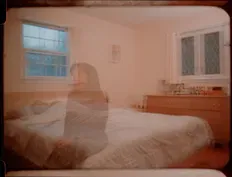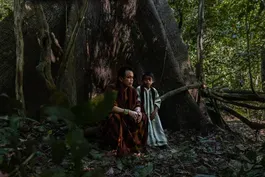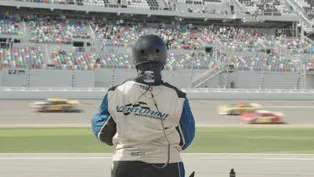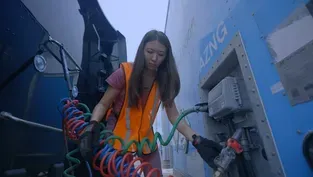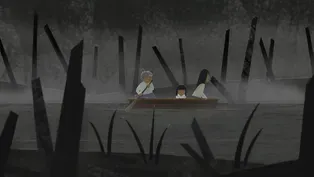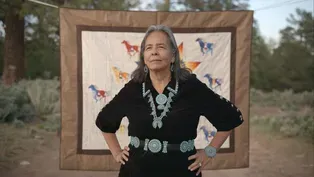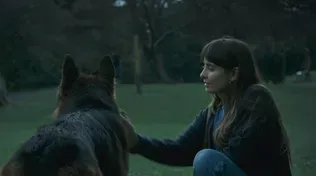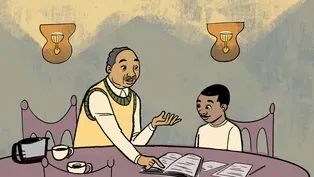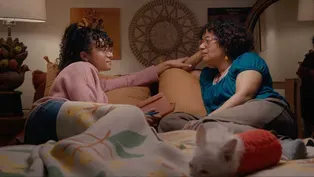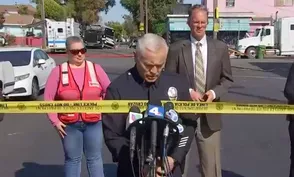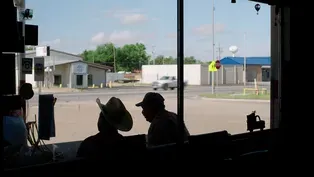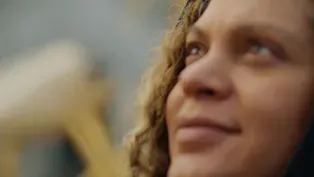
Coming Home
Special | 9m 24sVideo has Closed Captions
Palestinian-American dancers use traditional Dabka to connect with their homeland.
A collective of Palestinian-American dancers living in Bay Ridge, Brooklyn use traditional Dabka as a way to connect to their community and homeland.
Major funding for POV is provided by PBS, The John D. and Catherine T. MacArthur Foundation, the Wyncote Foundation, Reva & David Logan Foundation, the Open Society Foundations and the...

Coming Home
Special | 9m 24sVideo has Closed Captions
A collective of Palestinian-American dancers living in Bay Ridge, Brooklyn use traditional Dabka as a way to connect to their community and homeland.
How to Watch POV
POV is available to stream on pbs.org and the free PBS App, available on iPhone, Apple TV, Android TV, Android smartphones, Amazon Fire TV, Amazon Fire Tablet, Roku, Samsung Smart TV, and Vizio.

POV Playlist
Every two weeks, we curate a selection of POV docs, old and new, around a central theme. Stream while you can — until the next Playlist!Providing Support for PBS.org
Learn Moreabout PBS online sponsorshipMore from This Collection
Video has Audio Description, Closed Captions
A Vietnamese American daughter captures her parents on 16mm as they dream of their homeland. (8m 4s)
Shirampari: Legacies of the River
Video has Audio Description, Closed Captions
Set in the heart of the Amazon, a young Ashéninka boy must face his fears and catch a giant catfish. (15m 24s)
Video has Audio Description, Closed Captions
The Race to Pit Row - NASCAR’s first black woman pit crew member. (14m 19s)
Video has Audio Description, Closed Captions
A young med student drives big rigs for tuition fees. (11m 13s)
Video has Audio Description, Closed Captions
Thao recounts the story of her family’s escape through the lens of her fascination with ants. (10m 24s)
Video has Audio Description, Closed Captions
A glimpse into the lives of three quilters in the American West. (17m 14s)
a film is a goodbye that never ends
Video has Audio Description, Closed Captions
Filmmaker María Luisa Santos grapples with saying goodbye to Turbo, a dog she has come to adore. (13m 44s)
StoryCorps Shorts: The Family Equation
Video has Closed Captions
Lynn Weaver and his daughter talk about his father who worked as a janitor and chauffeur. (2m 27s)
Video has Audio Description, Closed Captions
A filmmaker's conversations with her mom unveil intergenerational healing and a new start. (12m 4s)
When The LAPD Blows Up Your Neighborhood
Video has Audio Description, Closed Captions
Locals and news organizations witness a volatile situation turn into a literal powder keg. (19m 1s)
Video has Audio Description, Closed Captions
A filmmaker returns to West Texas and documents the local oil industry's boom and bust. (10m 35s)
Video has Audio Description, Closed Captions
After 16 years of incarceration, Sol recovers her sense of self through gardening. (20m 37s)
Providing Support for PBS.org
Learn Moreabout PBS online sponsorship-We grew up on this basketball court right here.
This is BK.
This is BK.
♪♪ ♪♪ ♪♪ -Dabka's like drawing art with your feet, where if you really go deep into it, you'll experience a lot more than just regular foot moves.
-♪ What's the soul of the 47?
♪ Hmm, what's the soul of the 47?
♪ ♪ Hmm, what's that soul in the 47?
♪ ♪ Sham put the soul in the 47 ♪ ♪ Hmm, no agent, no guarantee ♪ ♪ Ahh, no landlord on your back, now ♪ ♪ No country, no form ♪ ♪ Back to the peasants to the fellahin born, yuh ♪ ♪♪ ♪♪ -Palestine is home.
♪♪ -Palestine is the place that my parents came from, the place that my grandparents came from.
It really represents who I am.
-Something that's warm, filled with love, filled with hope, too.
♪♪ Doing dabka is, like, the closest thing I get to being back home in Palestine.
♪♪ -When I'm in Bay Ridge, I feel closer to who I am.
I'm not gonna say closer to home, but closer to my culture, to my people.
My name is Amer Abdelrasoul.
I am the leader of the Freedom Dabka Group based out of New York City.
[ Conversations in Arabic ] It started with six of us.
Now we are about 18 members.
♪♪ We've been doing so many weddings, festivals, stuff like that.
♪♪ [ Buzzing ] [ Tapping ] The first time I did dabka, maybe I was 10, 11.
I did it in Palestine in my village.
I remember, like, the older guys, they wanted to be organized.
They never liked kids joining the dabka, so they'd always kick them out.
Like, "Little kids, get out."
I was always fascinated in it, so I'd always try, like, getting myself in between somebody just so I could learn.
-FDG's like one big family.
All three of us are like the youngest siblings.
We're forced to do the work.
-Yeah, we gotta do the rookie stuff.
Yeah, my mom, yeah.
Of course, she misses home, you know?
We got our family over there, you know?
That's where she grew up for like half of her life.
Even though I didn't grow up there, she wants to make sure that, you know, I know where I came from, I'm happy with where I came from, you know, I'm proud to be Palestinian.
-Free, free Palestine!
-Free, free Palestine!
-Free, free Palestine!
-Free, free Palestine!
-Free, free Palestine!
-Free, free Palestine!
-Free, free Palestine!
-Free, free Palestine!
-Free, free Palestine!
-Free, free Palestine!
-Free, free Palestine!
♪♪ -We hit.
-Shuffle.
Double down.
-Couple hundred.
-For me, dabka's a way to express my culture and where I came from, because when I was younger, you know, I always had, like, trouble expressing where I came from.
-Freedom Dabka Group is actually a group that changed my life.
It's where I learned about my culture and how to really treat people and how to show respect and how to earn respect.
♪♪ -I'm just doing my part in the city to represent the Palestinian culture.
♪♪ -We have to have that connection where we all understand each other.
When that's established, we get closer to each other and we feel like, "Yes, we did it, and we did it through teamwork."
♪♪ [ Child cries ] [ Conversations in Arabic ] -Pass me the bread.
Thank you.
-What do you mean, bro?
You know how much people I see and I talk to... -No, you have good immune system.
-The Freedom Dabka Group, actually, it originated from the time that they went back.
1995?
-2005.
-Okay.
2005.
They went back.
The whole family went back there.
They spent seven years.
-Six years.
-Uh, well...my memory is getting bad, I guess.
-Back home.
-When they went back home, you know, that was the main -- one of the reasons that they went back home -- to learn the culture.
And they formed this group.
[ Speaking Arabic ] They're doing excellent.
-I am happy because they are keeping the Palestinian heritage, but still our culture alive.
-Yeah.
-And no matter how Americanized you are, you still belong to your home, which is Palestine.
That's all I care about.
We are -- We are -- Like, you know, we have different situation as Palestinians, you know?
So we cannot forget where we come from, you know?
-They're watching my other stuff, our content on YouTube, on our Instagram, and especially the younger people on TikTok.
And that's how people call me like, "Hey, could you teach my son dabka?"
Do you teach my daughter dabka?"
-A lot.
They even tell me, the woman, when they see me in weddings.
-"We wanna learn.
We wanna teach."
They want to learn.
And that's something good 'cause the kids that grow up -- and that's something that they can always -- That's a form of identity for them that they're -- they have the Palestinian culture in them.
-Bye!
-[ Speaking Arabic ] -[ Singing in Arabic ] ♪♪ [ All cheering ] ♪♪ ♪♪ ♪♪ -[ Speaking Arabic ] The way the tent was set up, and the way the music -- And that's how they do it back home.
It definitely felt like we were in Palestine, especially when they brought out the kunafah and the whole barber when he came in.
That's all stuff they do in Palestine.
♪♪ ♪♪ -[ Singing in Arabic ] ♪♪ ♪♪ ♪♪ -Palestinian culture's always gonna live, no matter what happens.
♪♪ ♪♪ ♪♪ -[ Singing in Arabic ]
Major funding for POV is provided by PBS, The John D. and Catherine T. MacArthur Foundation, the Wyncote Foundation, Reva & David Logan Foundation, the Open Society Foundations and the...
